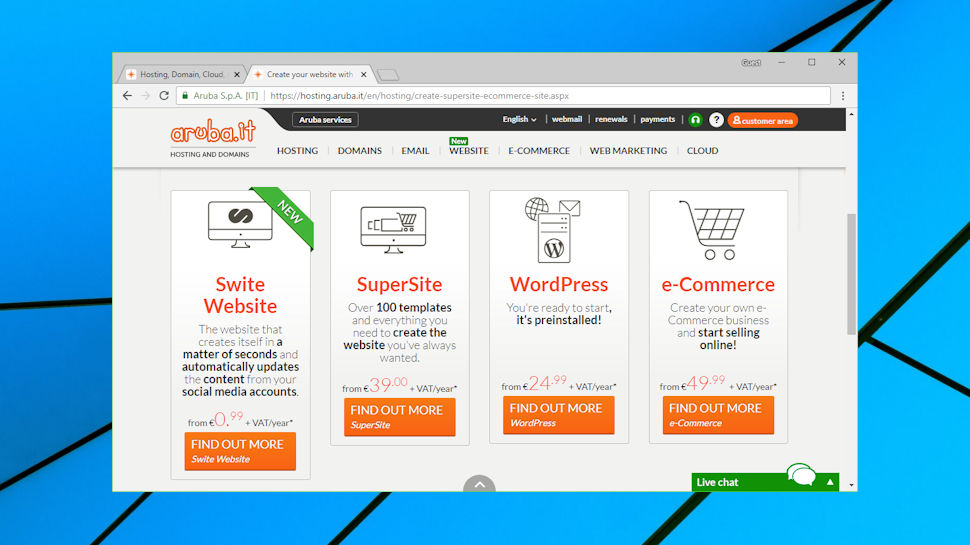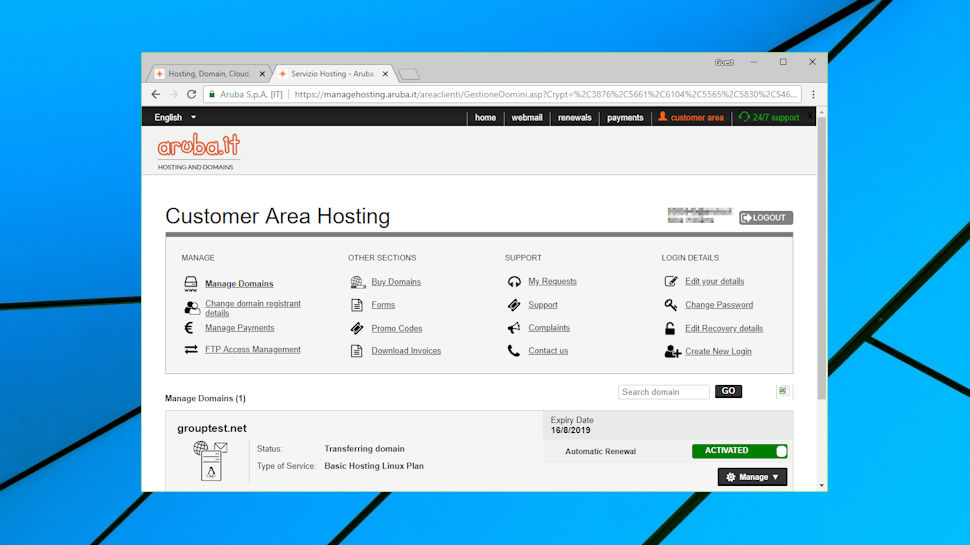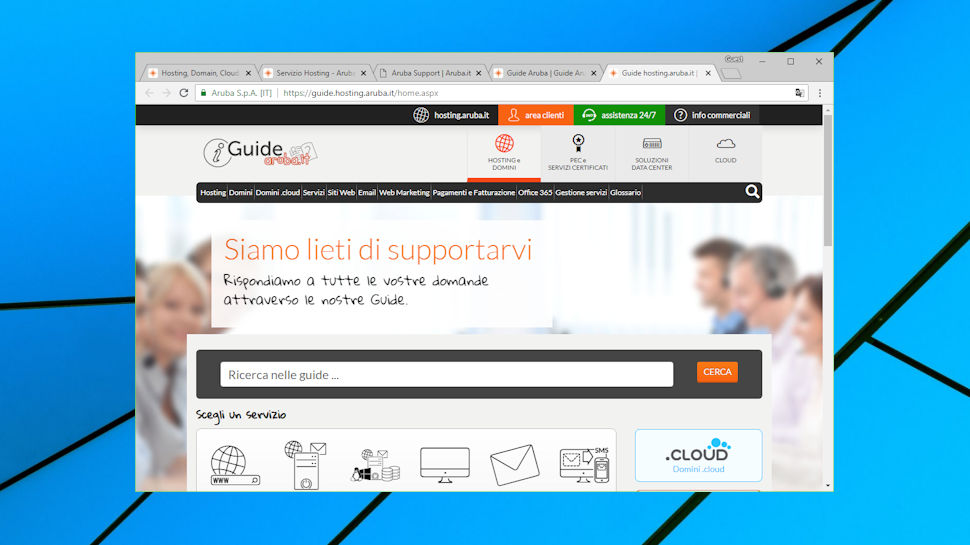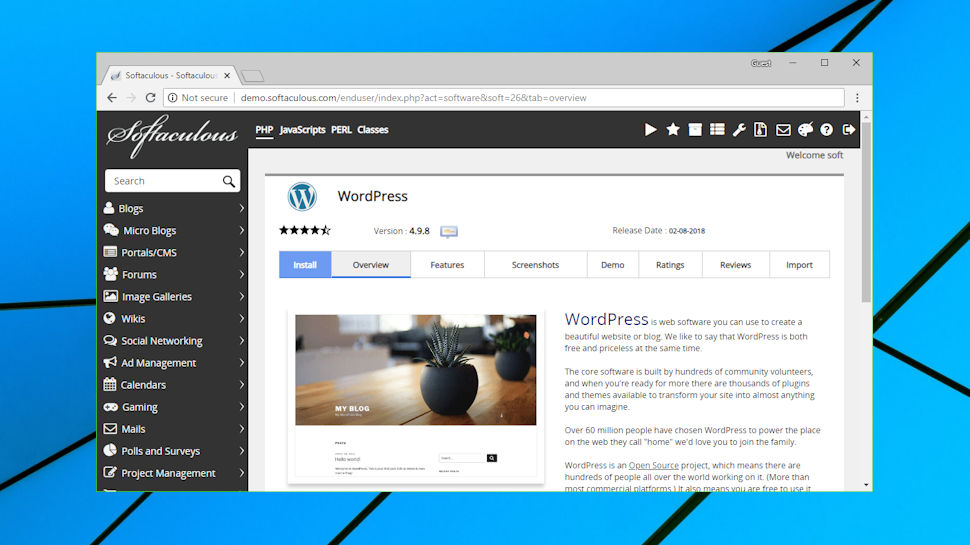Aruba
Aruba is a popular Spanish web host which offers a wide range of hosting services across its many European data centers (Italy, UK, France, Germany, Poland and Czech Republic.)
The company provides simple shared hosting, a website builder, hosted CMS plans (WordPress, PrestaShop, Joomla, Drupal, Magento), virtual private servers, dedicated servers, private clouds, and various supporting features from domain registration to email hosting and web marketing products.
Headline prices appear very, very low. Shared hosting starts at 11.99 Euros a year (£10.75, $13.69) - yes, a year - for the first term, 24.99 (£22.41, $28.54) on renewal. Sounds amazing, but beware, there are some less-than-obvious catches.
During our review, the discount only applied if we registered or transferred a new .cloud domain with Aruba, something we suspect most people won't be looking to do. The hosting only works with domains hosted by Aruba, so you'll need to transfer existing domains to them. Databases are an optional extra, and you get a custom control panel rather than cPanel.
Suddenly the plan didn't look quite so appealing, but even at 24.99 for the year, the specification isn't bad: a domain, five 1GB email inboxes, unlimited storage and bandwidth, an SSL certificate, daily backups, and 24/7 support via phone, email and ticket. You can even opt for Windows hosting at no extra cost.
Prices jump as you add more resources, but are still reasonable overall. The Basic plan gives you unlimited email accounts and 5 MySQL databases for a total of 19.99 Euros (£17.93, $22.83) in year one (subject to restrictions), 50 Euros (£44.84, $57.13) on renewal. That is significantly cheaper than 1&1's broadly comparable Basic plan, which gives you 'only' 500 email accounts, but 25 databases, for an annual £11.88 ($15.44) in year one, £59.99 ($77.99) afterwards.
Aruba supports both Windows and Linux hosting, and, unusually, you can get both for a one-off 21.99 Euros (£19.72, $28) for the first year, 34.99 (£31.38, $44.59) on renewal. This effectively gives you two web servers, one Windows, one Linux, and your website can make use of both. This means you can use applications made for either platform, and combine them in the same site.
VPS plans start at an amazing 1 Euro a month, and although this plan also has some significant issues (just 1 vCPU, 1GB RAM, 20GB storage, you can't choose the data center), it's just about usable. It costs considerably more to get some real VPS power, so for example a 2 VCPU, 4GB RAM and 80GB VPS costs 12.50 Euros a month, but that's still good value.
You can even have your very own dedicated server from just 19 Euros (£17, $24.20) a month. That gets you a horribly basic dual-core CPU and a single 1TB SATA - your laptop will probably be faster - but it's perhaps acceptable as a starter product and there are many more powerful options available.

Getting started
Finding the Aruba product you need can take a while, as there are so many to choose from, and the website doesn't always organize them as you might expect. There's an extra complication in the way some products are displayed only in Italian, too, although Google Chrome's 'Translate to English' feature once again saved the day.
Life becomes a little easier once you've located the appropriate plans, as the Aruba site has some detailed comparison tables to help you understand what's available.
The order process starts by choosing the domain you'd like to use. For our shared hosting plan, we were asked to register a new domain, or transfer one we owned already. There's no option to keep an existing domain with its current registrar and simply point its DNS records to Aruba, which is inconvenient, and may also be more expensive in the long run, depending on how your current registrar compares in terms of domain pricing (Aruba's domain products and prices are listed here).
Aruba's service page is a little more flexible, as you're able to extend most hosting products with a range of extras: more powerful email accounts, larger databases, WhoIs Privacy (a reasonable 2 Euros a month), a website builder, and more.
Creating an Aruba account requires handing over all kinds of personal information, including name, email address, physical address, telephone number, 'identity card' number, gender, date and place of birth.
Oddball translation issues made life more complicated. We've not come across a drop-down list of countries which used English language names for everything but 'United Kingdom', for instance, replacing it with 'Regno Unito', but we figured this out eventually.
Aruba supports payments via card, PayPal and bank transfer. The first two options are set to automatic renewal by default, but you can change this from your account control panel.
We handed over our cash in the usual way, and quickly received four Aruba emails (thanks for registering, a copy of Aruba's Privacy Policy, confirmation of the order, and acknowledgement of payment.)

If you've registered a new domain as a part of your plan, Aruba will activate your hosting, and you'll be able to access your control panel immediately.
If you're transferring a domain from another registrar, unfortunately, the process is a little more complicated. Aruba requires the transfer to be complete before you're able to access and set up your website, which means you could be waiting anything from a few hours to several days.

Managing your website
Aruba's basic Linux hosting plans come with the company's own control panel, rather than cPanel. It doesn't have as many features, but it's not difficult to learn, and you'll have the basics sorted out with minimal effort.
Uploading a static website or any other files is easy, thanks to standard FTP support and a simple file manager.

Softaculous gives you (almost) 1-click installations for WordPress, Joomla, Drupal, PrestaShop and hundreds of other popular web apps. It's probably the quickest and easiest way to get a working copy of WordPress on your domain.
Some Aruba plans use Swite to create an instant website based on your chosen social media account (Facebook, Twitter, Instagram.) Log in using your account, choose one of a very few templates (seven business-oriented, seven personal) and the site imports your posts and presents them in a simple website.
The service doesn't do very much, and depending on how your account is set up, it might not do anything at all. But you can customize the content and presentation, and once it's set up, the site should update automatically to display new social media content.

If Swite works for you, it's just about as simple a way to manage a website as you'll get. You can try it for free at Swite.com, and access it from the Swite.com domain (swite.com/yourname.) If you're interested, Swite can be purchased with domain registration for 9.99 Euros (£8.96, $11.40) per year, with various discounts for the first year, depending on the TLD (from 0.99 Euros (£0.89, $1.13) for .cloud, to 6.99 Euros (£6.27, $7.98) for .com.)
Support is available in various areas of the website, although from what we could see, most of it is in Italian only. If you prefer another language, Chrome's translation feature will help, but poorly organized content means it'll probably take a while to find useful information.
You can also contact support 24/7 via an Italian phone number, or raise a support ticket. We took the ticket route, and although it took 16 hours to get a reply, the response was genuinely helpful and fully answered our simple product question. That's not bad for a budget host, but the language issues must be a concern, and the service needs much better localization if it's going to win over English-language customers.
Final verdict
Aruba has interesting products and some low prices, but various catches and annoyances, and a lack of English language translations, make the service hard to recommend.
- We've also highlighted the best cheap web hosting sites in this roundup
0 comments:
Post a Comment